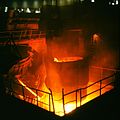Steel industry in the United Kingdom
The steel industry in the United Kingdom is a major sector of the British economy. In 2023, the United Kingdom was the world's 26th largest producer of crude steel and Europe's 8th largest.[1] It produced 5.6 million tonnes of crude steel, equivalent to 0.3% of global output.[2]
History
The steel industry employed 350,000 people when it was nationalised by Prime Minister Harold Wilson in 1967.[3]
In the 2020s, the steel industry faced crisis. Thousands of job losses at Port Talbot Steelworks lead to Plaid Cymru calling for nationalisation.[4] The Steel Industry (Special Measures) Act 2025 was passed to secure British Steel company at Scunthorpe Steelworks.[5]
Environmental impact
The steel industry is a significant contributor to greenhouse gas emissions by the United Kingdom. It is responsible for 2.2% of total greenhouse gas emissions and 13.4% of greenhouse gas emissions from manufacturing.[6] Environmental concerns have been cited as an issue for the industry.[7]
References
Citations
- ^ "World Steel in Figures 2024". World Steel Association. 27 May 2024. Archived from the original on 27 September 2024. Retrieved 17 October 2024.
- ^ Jozepa 2024, p. 6.
- ^ "The rise and fall of Britain's steel industry". BBC News. 2016-05-21. Retrieved 2025-04-14.
- ^ "Port Talbot: How steel town is grappling with 'life-changing' loss of more than 2,000 jobs". Sky News. Retrieved 2025-04-14.
- ^ "British Steel employees express fears over future of Scunthorpe plant". Sky News. Retrieved 2025-04-14.
- ^ Jozepa 2024, p. 7.
- ^ "Why the British steel industry is on the brink of extinction - or a green resurrection". Sky News. Retrieved 2025-04-14.
Bibliography
- This article incorporates text published under the United Kingdom Open Parliament Licence: Jozepa, Izle (15 October 2024). UK steel industry: statistics and policy (Report). House of Commons Library.
- Cottrell, Elizabeth (August 1981). The Giant with Feet of Clay: The British Steel Industry 1945-1981. Centre for Policy Studies. ISBN 978-0-905880-40-2. OCLC 8983978.

